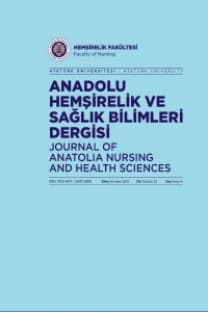Yenidoğan yoğunbakım ünitelerinde yatan yenidoğan ailelerinin yaşadıklerı güçlüklerin belirlenmesi
Determination of the difficulties of the families whose babies hospitalized in the newborn intensive care unit
___
- Akşit S, Cimete G (2001). Çocuğun yoğun bakım ünitesine kabülünde, annelere uygulanan hemşirelik bakımının annelerin anksiyete düzeyine etkisi. Cumhuriyet Üniversitesi Hemşirelik Yüksekokul Dergisi 5(2):25.
- Beal JA, Quinn M (2002). The Nurse Practitioner Role in the NICU as Perceived by Parents. The American Journal of Maternal/ Child Nursing 27(3):183-188.
- Blackburn S (1998).Environmental impact of the NICU on developmental outcomes. Journal of Perinatal Neonatal Nursing 4: 42-54.
- Carter M, Miles M (1983). Assessing parental stress in intensive care unit. American Journal of Maternal Child Nursing 8:354-359.
- Coyne IT (1996). Partnership in care, parents’ views of participiation in their hospitalized child’s care. Journal of Clinical Nursing 4(2):71-79.
- Curley MAQ, Maalaney PA (2001). Critical care of ınfants and children, Second Edition, Ed., Wb., Saunders Comp., 3-15.
- Dağoğlu T, Görak G (2002). Temel neonatoloji ve hemşirelik ilkeleri, Nobel Tıp Kitabevleri, 11-22.
- Davis L, Edwars H, Mohay H et al. (2003). The impact of very prematüre birth on the psychological health of mothers, early human development 73, Elsevier 61-70.
- Dolgun E, Yavuz M, Ertürk S ve ark. (2002). Çocuk cerrahi yoğun bakımda çocukları yatan anne- babaların durumluluk-sürekli kaygı düzeylerinin belirlenmesi, Hemşirelik Forumu 5(2): 28–29.
- Sönmez S (2002). Pediatrik yoğun bakım ünitesinde çocuğu yatan ailelerin saptadıkları gereksinimlerin hemşireler tarafından algılanması, Yayınlanmamış Doktora Tezi, Ege Üniversitesi, Sağlık Bilimleri Enstitüsü, İzmir.
- Ergenekon E (2001). Yenidoğan yoğun bakım ünitesi tasarımı, Hekimler Birliği Vakfı Türkiye Klinikleri. Pediatri Dergisi 10(1):1-2.
- Gale G, Frank LS, Kools S et al. (2004). Parents’ perceptions of their infant’s pain experience in the NICU, International Journal of Nursing Studies 41:51-58.
- Holloway E (1994). Parent and occupational therapist collabration in the Neonatal İntensive Care Unit. The American Journal of Occupational Therapy 48:535-538.
- Mendoca D, Warren NA (1998). “Percevied and unmet needs of citical care family members”. Critical Care Bursing Quartley 21(1):58-67.
- Mıles MS, Brunssen SH (2003). Psychometric propertıes of the parental stressor scale: ınfant hospıtalıatıon. Advences in Neonatal Care 3(4):189-196.
- Neyzi O (2002). Pediatri, Yenidoğanın Değerlendirilmesi. Cilt:1, Nobel Tıp Kitabevleri, 306-307.
- Padden T, Glenn S (1997). Maternal experiences of preterm birth and neonatal intensive care. Carfax Publishing Company May, 15(2):1-16.
- Rogers M (1996). Textbook of pediatric intensive care, thırd edition, Williams ve Wilkins a Waverly Company, 1601-1604.
- Tansuğ N (2003). Yenidoğan infeksiyonlarına nasıl yaklaşalım? SSK Tepecik Eğitim Hastanesi Dergisi,13(2):87-89.
- Tarcan A, Cındık N, Gürakan B (2002). Yenidoğanda arteriyal ve santral venöz katater uygulamaları, Hekimler Birliği Vakfı Türkiye Klinikleri, Pediatri Dergisi l (11): 203-205.
- Turan T, Başbakkal Z, Özbek Ş (2008). Effect of nursing interventions on stressors of parents of premature infants in neonatal intensive care unit. Journal of Clinical Nursing 17: 2856-2866.
- Ward K (2001). Perceived Needs of Parents of Critically İll İnfants in a Neonatal İntensive Care Unıt. Pediatric Nursing 27(3):281-286.
- Whitfield MF (2003). Psychosocial effects of intensive care on infants and families after discharge. Seminars in Neonatology Saunders 8: 185-193.
- Young SR, Watson MA, Corff KE et al. (1997). Parent stress and coping in NICU and PICU. Journal of Pediatric Nursing 12(3):169-77.
- ISSN: 1309-5471
- Yayın Aralığı: Yılda 4 Sayı
- Yayıncı: Atatürk Üniversitesi Hemşirelik Fakültesi
KADIN MAHKUMLARDA GENİTAL HİJYEN DAVRANIŞLARI
İlkay ARSLAN ÖZKAN, Özen KULAKAÇ
EKSTERNAL FİKSATÖR ÇİVİ BÖLGESİ BAKIMI
Kadın mahkumlarda genital hijyen davranışları
Özen KULAKAÇ, İlkay ÖZKAN ARSLAN
ÜNİVERSİTE ÖĞRENCİLERİNİN CİNSEL SAĞLIK VE ÜREME SAĞLIĞI HAKKINDAKİ BİLGİ DÜZEYİLERİNİN BELİRLENMESİ
Özlem KARABULUTLU, Özlem KARABULUTLU, Meral KILIÇ
Yenidoğan yoğunbakım ünitelerinde yatan yenidoğan ailelerinin yaşadıklerı güçlüklerin belirlenmesi
HOLİSTİK BAKIMIN BİR BOYUTU: SPİRİTUALİTE, DOĞASI ve HEMŞİRELİKLE İLİŞKİSİ
Hemşirelerin karşılaştıkları etik ikilemlerin incelenmesi
Ayfer ELÇİĞİL, Birgül MIZRAK, Demet BAHÇELİOĞLU, Demet DEMİRTAŞ, Dileka ÖZDEMİR, Elvin ÖZGÜR, Hatice YAVUZ, Ayşe BEŞER, Zuhal BAHAR
Üniversite öğrencilerinin cinsel sağlık ve üreme sağlığı hakkındaki bilgi düzeylerinin belirlenmesi
Meral KILIÇ, Özlem KARABULUTLU
